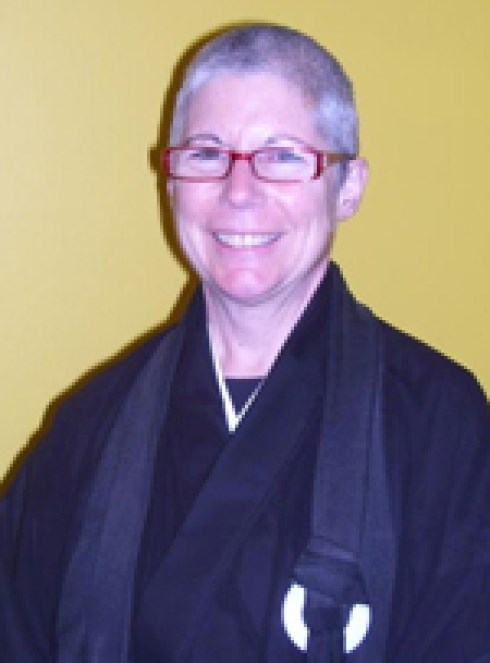Crack! Crack! Two quick hits on each shoulder. I struck my fellow Zen student twice on one shoulder, twice on the other, using the Zen stick called the Kyosaku. Tears streamed down my face. Though my friend was unharmed, strong emotions flowed through me, leaving me both unsettled and curious.�� The strikes are precisely aimed at the trapezius muscles, are meant to help energize the sitter during long hours of meditation, and are only administered upon request.
Why, then, the powerful reaction in me, the striker?
This is something I would puzzle over for the next few years.
As babies, we are born tiny, vulnerable, and ready to love. Our hearts and minds are wide open and receptive. Then, as we go through life, we experience pain of one kind or another. My first conscious memory of pain was dropping a metal tin on my little toe. Because I loved to go barefoot, this was the first of many toe injuries! And, not only that, I had been struggling with my older brother, so I not only had a very painful toe, but also a painful heart – my feelings were hurt, but I didn’t know it then.
As children, we don’t know how to deal with pain other than cry. Often issues are never resolved, and the pain is stored away in the heart. As teenagers and adults we follow the same pattern. We’re busy and hurts come at us in quick succession sometimes. There’s no breathing space to deal with painful issues at the time, so we store them away (sit on them) to deal with later, and soldier on.
Only ‘later’ never comes, and we end up with a storehouse of unprocessed pain, while the heart shrinks, forced to armour itself in order to withstand “the slings and arrows of outrageous fortune.”
In Zen terms, we suffer. You may have heard the Zen phrase ‘Life is suffering’. Of course this isn’t true, life is wonderful and beautiful, amazing, sometimes boring, banal, plain, sometimes shocking, painful, and scary. But as the heart develops coping mechanisms, one of them is to stop feeling so much anymore. We shut down a little with every hurt, and just don’t notice that we are no longer feeling much joy, love, gratitude, happiness, openness, curiosity. Life becomes suffering.
One of the early benefits of Zen meditation is that now there is time to just sit and be in the present moment.
We sit there aware of our surroundings, full of curiosity and aspiration. The quiet environment, attention to the breath, and deep relaxation, immediately diminish stress. Breathing deeply into the lower abdomen is very relaxing and soothing. Anchoring ourselves in the present moment, not thinking about the future or reminiscing about the past gives us distance from our problems, and a healthy perspective on them.
When you think about it, surprisingly, the present moment is really all there is. It is filled with everything, and everything is here with us: Higgs bosons, atoms, air, tiny creatures, birds, plants, salmon, grizzly bears, people, war, refugees, the environment, water, the sun, the planets, the vast cosmos. Over time, the feeling of being separate, isolated, and alone naturally begins to dissolve.
Also over time, during daily meditation or during Zen intensives, past suffering comes up and is released. My inchoate feelings around being hit, or hitting someone and being punished for it, and my fear for a violent world, at last float into my consciousness and explain my earlier tears. This is experienced not in minute detail, but as though baggage has dropped away. I feel lighter and more flexible, and as though colour has only now begun to return to a previously grey world. The heart begins to loosen its armouring, begins to blossom as issues dissolve, and feeling returns.
As a beginner at open-hearted living, I am attempting to live peacefully and respectfully in a world of suffering.�� First Nations people are telling the story of their centuries long suffering, Black men continue to be shot by police, women, LGBTQ and the marginalized suffer from aggression and the generalized hatred of our society, refugees are failing to find security, grizzly bears are on the move perhaps because of climate change, and local bats are about to experience a deadly epidemic.
Being awake, aware, and responsive in today’s world takes both a warrior’s courage and a wise woman’s insight.
However, because the healthy heart is a master of paradoxes, it is possible to be happy, whole and complete at the same time as being heartbroken for the world. In fact, if we pay attention, we may find that our most creative and positive solutions come from this very rare state of heart and mind.
 Soshin McMurchy��is a priest with Zenwest Buddhist Society, and serves as the Buddhist Chaplain with the University of��Victoria Multifaith Services. She works part-time at the Greater Victoria��Public Library and lives in Victoria with her partner of 38 years.
Soshin McMurchy��is a priest with Zenwest Buddhist Society, and serves as the Buddhist Chaplain with the University of��Victoria Multifaith Services. She works part-time at the Greater Victoria��Public Library and lives in Victoria with her partner of 38 years.
You can read more articles from our interfaith blog, Spiritually Speaking


